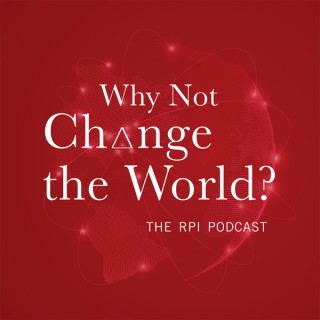Why Not Change the World? The RPI Podcast
Follow Why Not Change the World? The RPI PodcastWhy Not Change the World? brings leading experts from different disciplines together on the campus of Rensselaer Polytechnic Institute to discuss the global and interconnected challenges facing humanity.
Why Not Change the World? The RPI Podcast
- Apr 27, 2021 LATEST EPISODE
- every other week NEW EPISODES
- 24m AVG DURATION
- 31 EPISODES
Latest episodes from Why Not Change the World? The RPI Podcast

Leading experts discuss the science and engineering involved in the exploration of the red planet as they celebrate the NASA Mars 2020 Perseverance rover landing.

Accomplished Rensselaer alumni share important insights on entrepreneurship.

Researchers explain how the structure of something can make all the difference, whether that thing is a laboratory or a tumor.

Research projects that sound like the stuff of science fiction turn out to be as real as they are fascinating.

A marketing expert and a behavioral economist discuss strategies for improving the communication and processing of information.

Two experts shine new light, both literally and metaphorically, on the COVID-19 pandemic.

Researchers offer up new ways of looking at things that have been around for a long time and explain how they could be improved.

Two engineers share insights into promising projects aimed at stopping SARS-CoV-2, the virus that causes COVID-19, from spreading and infecting humans.

A telecommuting expert and a musician discuss the challenges and opportunities of working remotely.

Two scientists discuss their unique approaches to modeling the spread of COVID-19 and how their work is informing leaders in education, government, and other industries.

A game designer and an architect provide new perspectives on old conflicts, both large and small.

Researchers provide new insights on experiments being conducted in space and recent revelations about our galaxy.

A neuroscientist and an engineer offer insights into the workings of the human brain — and how they might be improved.

Three experts share unique perspectives on the effects of climate change and how humans might respond.

Two undergraduate students getting national attention for their world-changing work share perspectives on science, architecture, and entrepreneurship.

In the midst of the COVID-19 pandemic, two researchers explain their urgent effort to equip N95 respirator masks with antiviral properties.

Strategies for increasing diversity, inclusion, and equity in higher education are considered by two leaders implementing them at Rensselaer.

An anthropologist and an engineer outline their interdisciplinary effort to increase awareness about how humans impact the planet.

An architect and a systems engineer explore how new approaches to building materials and supply chains will shape the future.

Researchers within the Rensselaer-IBM Artificial Intelligence Research Collaboration talk about their work in the world of social media.

Two scientists describe the extreme conditions in which life can be found and tell us what it means about the origins of Earth.

The use of a life-saving drug and the social movement to make it available is examined from both historical and personal perspectives.

The team behind AiMOS, the powerful new supercomputer at Rensselaer Polytechnic Institute, explains how it could change the world.

Leading experts in lighting and bone health reveal how their research tackles Alzheimer’s disease in new and unexpected ways.

In a special episode, two prominent inventors look to the future and offer their advice on how to prepare for it.

Two engineers reflect on what drew them to the field and how it can be used to change the world.

A bioinformatics researcher and an expert in aquatic ecosystems explore how human activities impact natural systems.

An electrical engineer and an aerospace engineer describe their vision for how virtual reality can be used to teach a new generation of students.

A bestselling author and an educator talk about the effects of technology on humanity and how to think about these changes.

A health-care data expert and a biomedical engineer discuss how data analysis can be used to tackle today’s biggest health challenges.

An artificial intelligence expert and an accomplished musician consider how humans could and should responsibly deploy new technologies.








